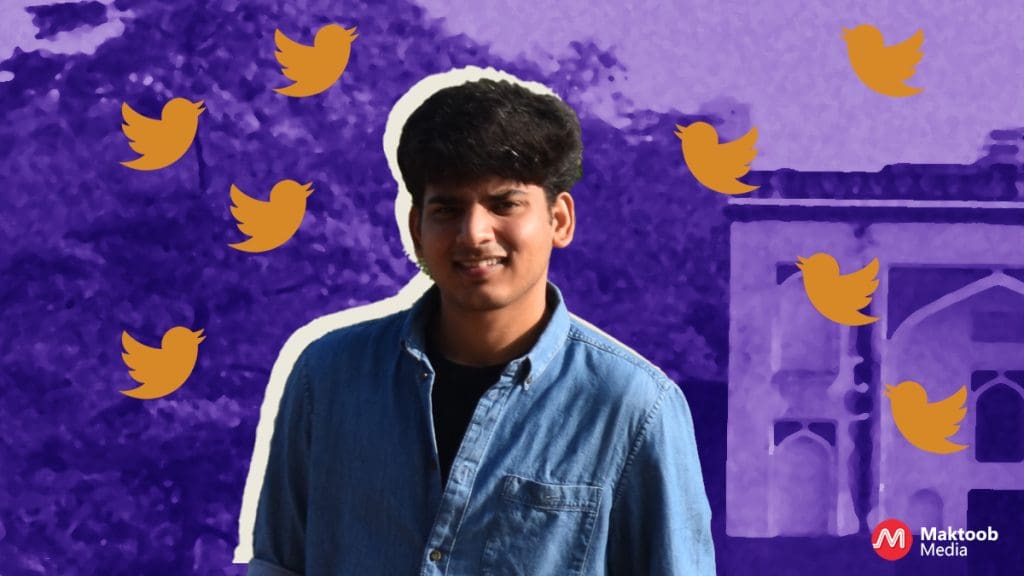
Mohammad Omar
I am Omar. A few weeks ago, I started a fundraiser for my MPhil degree at the University of Oxford. I had received an offer for admission to the Modern South Asian Studies program in April this year. However, I was unsure if I would be able to go since the cost of living and tuition fees were unaffordable.
My campaign received a lot of hate. I had mentioned that my study would be about the contemporary marginalisation and suppression of Muslims in India. All the hate-filled Islamophobia I received, from tweets to DMs, is not directed toward me but my Muslim identity. A Muslim wanting to study or finding an opportunity is unbearable to right-wing groups and they resort to abuses and trolling.
I, like other Muslims, faced Islamophobia from school to college. I was called terms like ‘Pakistani’ and ‘Jihadi’ were often. This hate and bigotry have risen to such a level where a huge bloc of people are in denial about Muslim existence in this country.
My father was a patient of Chronic Obstructive Pulmonary Disease (COPD) that had progressed to a clinically severe stage. In November 2020 when I was preparing my MPhil applications, he got infected with Covid-19 and was critically ill in the ICU at AIIMS, New Delhi. In December he was discharged while yet on oxygen support but due to post-Covid complications, he breathed his last on 9th January 2021.
I was determined to study to fulfil my father’s deep commitment to my education. Hence, I decided to start this fundraiser.
Muslims in India are being systematically alienated and this alienation is made possible by normalising myths like Muslim overpopulation, terrorism, disloyalty and making these an accepted reality in all spheres through polarised narratives and misinformation. These myths are prevalent in the Islamophobic tweets that were subjected towards me. In reply to one of my tweets about the fundraiser a man says “bomb blast ke funds ekattha kar raha hoga” — he must be collected funds for bomb blasts, another man points out “Hindus giving the majority of the contributions to a Muslim is problematic”.
Anti-Muslim myths have been inseminated in popular culture so well that we have become numb to the impact it has on the people it is being subjected towards. Despite being aware of my situation people did not shy away from making Islamophobic comments concerning my parents either, a woman and also a doctor in reply to my tweets goes on to comment “abba banata hai puncture aur bete ko padhna hai Oxford me” — father works at a tire shop and the son aspires to study at Oxford.
The fact that highly educated people have become capable of such kind of hate is a testament to the extent to which Islamophobia has become internalised in our society.
Muslim identity is vilified and criminalised to such an extent that people are willing to say the vilest and hateful things to troll someone just because they see that person as a Muslim. People are unable to see Muslims in education, much like every other space where they might be able to voice their opinions. In my research, I wanted to talk about how this systematic alienation is normalised by integrating a demonised image of the Muslim ‘Other’ into the mainstream.
Projecting Muslims as hyper-masculine and deviant and Muslim women as passive actors with no real agency carries a dual function of assuring the Hindu ‘Self’ of its moral superiority and at the same time creates insecurity of the hypersexual and immoral masculinity of the Muslim ‘Other’.
The mainstreaming of this image and the anxiety that it produces is used to mobilise the Hindus in a call to protect their culture and identity and can be used to extract extremist reactions from the threatened Hindu identity. The hate that I received is only the surface and is nothing compared to the hate and Islamophobia that Muslim women face every day. An example of this extremism is the “Sulli Deals” app, created by a Hindu radical group, wherein more than 80 Muslim women were put up for sale and their pictures were used without consent.
We are seeing this hate transition into policy at a very fast pace with things like CAA, anti-conversion, love jihad laws all of which are used to target Indian Muslims specifically and make their existence difficult in this country. I feel that raising awareness and creating consciousness of this suppression is the first step towards resistance, which is why I want to study this subject and take my research forward.
While all the abuses, threats and trolling that I received are extremely personal, I can see that they are evoked by disgust and intolerance towards my Muslim identity. This experience has made me even more determined to pursue this degree and take my research forward. Hate against a particular identity, cultivated through myths and misinformation is hazardous for a nation’s integrity and well being, which is why I feel that studying this hate and polarisation is much needed and is a cause worth supporting.
Omar is a graduate of School of Oriental and African Studies. He is having a fund-raising program to support his academic expenses for Mphil in Modern South Asian Studies, University of Oxford. Here you can read the details.



